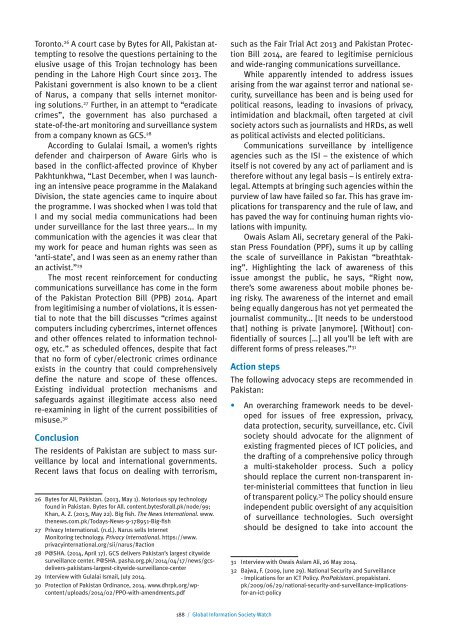W7y8w3
W7y8w3
W7y8w3
Create successful ePaper yourself
Turn your PDF publications into a flip-book with our unique Google optimized e-Paper software.
Toronto. 26 A court case by Bytes for All, Pakistan attemptingto resolve the questions pertaining to theelusive usage of this Trojan technology has beenpending in the Lahore High Court since 2013. ThePakistani government is also known to be a clientof Narus, a company that sells internet monitoringsolutions. 27 Further, in an attempt to “eradicatecrimes”, the government has also purchased astate-of-the-art monitoring and surveillance systemfrom a company known as GCS. 28According to Gulalai Ismail, a women’s rightsdefender and chairperson of Aware Girls who isbased in the conflict-affected province of KhyberPakhtunkhwa, “Last December, when I was launchingan intensive peace programme in the MalakandDivision, the state agencies came to inquire aboutthe programme. I was shocked when I was told thatI and my social media communications had beenunder surveillance for the last three years... In mycommunication with the agencies it was clear thatmy work for peace and human rights was seen as‘anti-state’, and I was seen as an enemy rather thanan activist.” 29The most recent reinforcement for conductingcommunications surveillance has come in the formof the Pakistan Protection Bill (PPB) 2014. Apartfrom legitimising a number of violations, it is essentialto note that the bill discusses “crimes againstcomputers including cybercrimes, internet offencesand other offences related to information technology,etc.” as scheduled offences, despite that factthat no form of cyber/electronic crimes ordinanceexists in the country that could comprehensivelydefine the nature and scope of these offences.Existing individual protection mechanisms andsafeguards against illegitimate access also needre-examining in light of the current possibilities ofmisuse. 30ConclusionThe residents of Pakistan are subject to mass surveillanceby local and international governments.Recent laws that focus on dealing with terrorism,26 Bytes for All, Pakistan. (2013, May 1). Notorious spy technologyfound in Pakistan. Bytes for All. content.bytesforall.pk/node/99;Khan, A. Z. (2013, May 22). Big fish. The News International. www.thenews.com.pk/Todays-News-9-178951-Big-fish27 Privacy International. (n.d.). Narus sells InternetMonitoring technology. Privacy International. https://www.privacyinternational.org/sii/narus/#action28 P@SHA. (2014, April 17). GCS delivers Pakistan’s largest citywidesurveillance center. P@SHA. pasha.org.pk/2014/04/17/news/gcsdelivers-pakistans-largest-citywide-surveillance-center29 Interview with Gulalai Ismail, July 2014.30 Protection of Pakistan Ordinance, 2014. www.dhrpk.org/wpcontent/uploads/2014/02/PPO-with-amendments.pdfsuch as the Fair Trial Act 2013 and Pakistan ProtectionBill 2014, are feared to legitimise perniciousand wide-ranging communications surveillance.While apparently intended to address issuesarising from the war against terror and national security,surveillance has been and is being used forpolitical reasons, leading to invasions of privacy,intimidation and blackmail, often targeted at civilsociety actors such as journalists and HRDs, as wellas political activists and elected politicians.Communications surveillance by intelligenceagencies such as the ISI – the existence of whichitself is not covered by any act of parliament and istherefore without any legal basis – is entirely extralegal.Attempts at bringing such agencies within thepurview of law have failed so far. This has grave implicationsfor transparency and the rule of law, andhas paved the way for continuing human rights violationswith impunity.Owais Aslam Ali, secretary general of the PakistanPress Foundation (PPF), sums it up by callingthe scale of surveillance in Pakistan “breathtaking”.Highlighting the lack of awareness of thisissue amongst the public, he says, “Right now,there’s some awareness about mobile phones beingrisky. The awareness of the internet and emailbeing equally dangerous has not yet permeated thejournalist community... [It needs to be understoodthat] nothing is private [anymore]. [Without] confidentiallyof sources […] all you’ll be left with aredifferent forms of press releases.” 31Action stepsThe following advocacy steps are recommended inPakistan:• An overarching framework needs to be developedfor issues of free expression, privacy,data protection, security, surveillance, etc. Civilsociety should advocate for the alignment ofexisting fragmented pieces of ICT policies, andthe drafting of a comprehensive policy througha multi-stakeholder process. Such a policyshould replace the current non-transparent inter-ministerialcommittees that function in lieuof transparent policy. 32 The policy should ensureindependent public oversight of any acquisitionof surveillance technologies. Such oversightshould be designed to take into account the31 Interview with Owais Aslam Ali, 26 May 2014.32 Bajwa, F. (2009, June 29). National Security and Surveillance- Implications for an ICT Policy. ProPakistani. propakistani.pk/2009/06/29/national-security-and-surveillance-implicationsfor-an-ict-policypotential for human rights violations inherent inthese technologies.• Certain surveillance-focused provisions in lawssuch as the Investigation for Fair Trial Act 2013that are considered predatory to human rightsneed to be examined against internationalhuman rights benchmarks, such as the InternationalPrinciples on the Application of HumanRights to Communications Surveillance, 33 andchallenged in courts of law. 34• With regard to international surveillance, Pakistanicivil society must become active in relevantinternational forums to pressure foreign governmentsto cease mass surveillance of Pakistanicitizens. 35• Public awareness needs to be raised regardingthe risks of communications surveillance andways to counter it through digital security toolsand skills.33 https://en.necessaryandproportionate.org/text34 Bytes for All’s petition challenging the FTA 2013 is currently underreview in the Lahore High Court, Pakistan.35 Bytes for All in collaboration with Privacy International andother international human rights groups challenged the GCHQon mass surveillance of Pakistani citizens at the InvestigatoryPowers Tribunal in February 2014. See: Clark, L. (2014, January19). Pakistani human rights group sues UK government fordiscriminatory GCHQ surveillance. Wired.co.uk. www.wired.co.uk/news/archive/2014-01/09/pakistan-human-rights-sues-uk• Public awareness about how communicationssurveillance violates fundamental humanrights standards needs to be raised in order topressure the government and influence policychange.• Civil society must lobby to bring extra-legal intelligenceagencies within the purview of law.• The link between various forms of electroniccommunications surveillance and offline methodsof surveillance needs to be highlighted fortraditional HRD organisations not necessarilywell-versed in the latest issues on internet governance,online privacy, modern technology andhuman rights.188 / Global Information Society Watch Pakistan / 189


